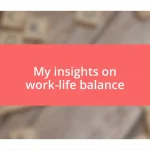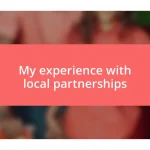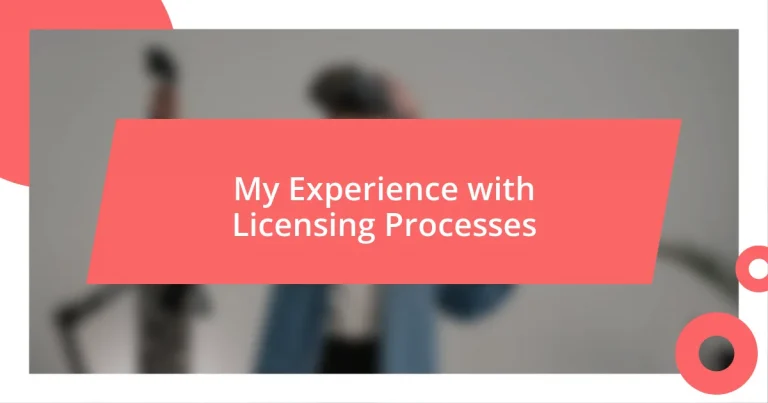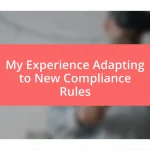Key takeaways:
- Preparation, including researching regulations and networking, is crucial for managing the licensing journey effectively.
- Meticulous documentation gathering fosters confidence and smoothens the submission process.
- Maintaining a positive mindset and adaptive strategies helps navigate unexpected challenges and approval timelines successfully.
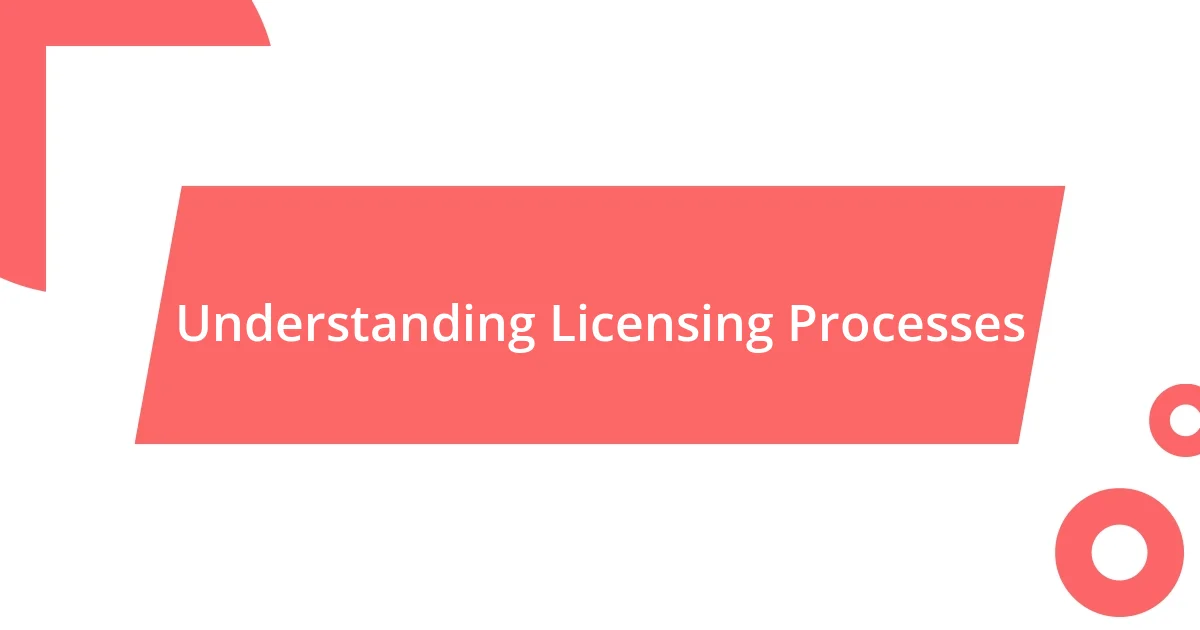
Understanding Licensing Processes
Understanding licensing processes can sometimes feel overwhelming, especially when I recall my own journey through various applications. I vividly remember the paperwork pile that seemed to multiply overnight, evoking a mix of excitement and anxiety about my future. Have you ever felt that pressure to get everything just right?
Each licensing process is unique, often dictated by the specific industry and regulations that govern it. When I was navigating the licensing for my business, every step felt like a test of my patience and persistence. I had to learn quickly that comprehending the specific requirements was crucial, as even the smallest detail could lead to delays or, worse, a denial.
It’s not just about filling forms; it’s about understanding the underlying reasons behind each requirement. I learned that these processes aim to ensure safety, quality, and compliance, ultimately protecting both the business and its customers. Have you ever paused to consider what motivates these regulations? I certainly did, and it shifted my perspective from seeing them as mere obstacles to recognizing them as essential safeguards within our industries.
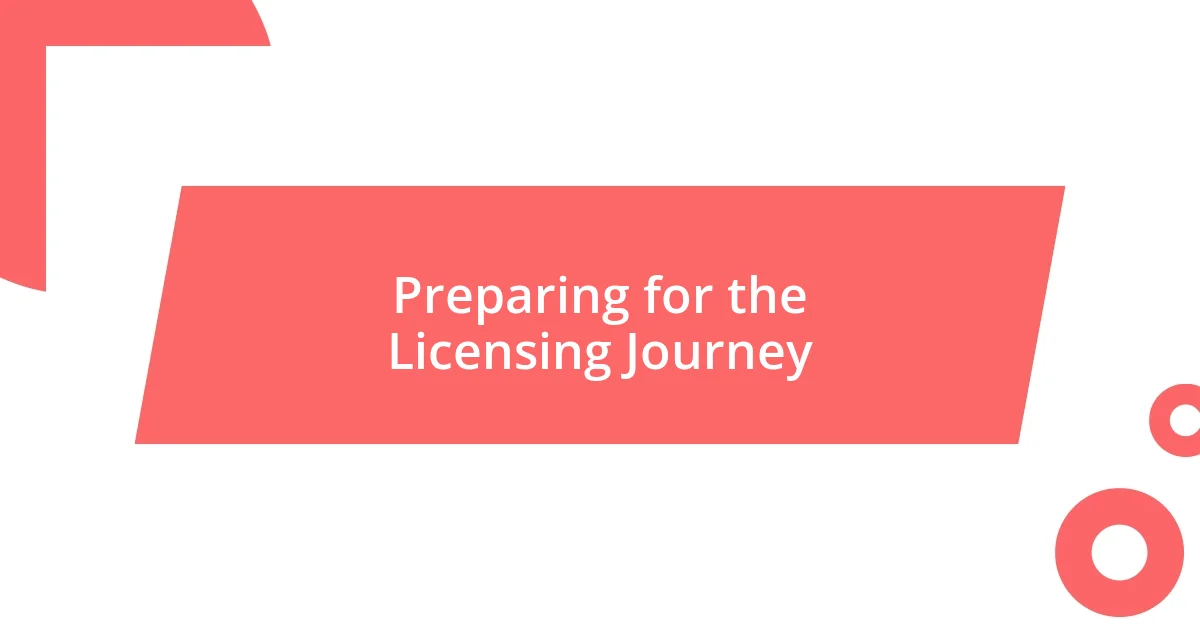
Preparing for the Licensing Journey
Preparing for the licensing journey is a crucial first step that sets the tone for everything that follows. I remember sitting down with a cup of coffee, feeling a bit like I was about to embark on an expedition. It helped to create a checklist of all the requirements ahead of me. This proactive approach reduced my anxiety significantly and made the process feel less daunting—almost like a fun puzzle to solve.
One thing that surprised me was just how much research went into understanding local regulations. I initially thought gathering documents would take the longest time, but figuring out what was actually required turned out to be a time-consuming endeavor in itself. I found myself scrolling through various websites and talking to others in my field for insights—have you ever gotten lost in a rabbit hole of information? Those moments felt frustrating, yet they also started to build my confidence, knowing I was proactively seeking the right steps.
In preparing for my licensing, I also found that networking was invaluable. Engaging with professionals who had already navigated the journey felt like having a well-informed tour guide through a dense forest. I still remember the relief and comfort that came from having someone to ask questions, share experiences, and even vent frustrations. Honestly, I can’t stress enough how building that support network can ease the burden; does that resonate with you?
| Preparation Steps | My Experience |
|---|---|
| Creating a Checklist | Reduced anxiety and made it feel manageable. |
| Researching Regulations | Took time but built my confidence to tackle requirements. |
| Networking with Professionals | Provided support, guidance, and shared insights. |
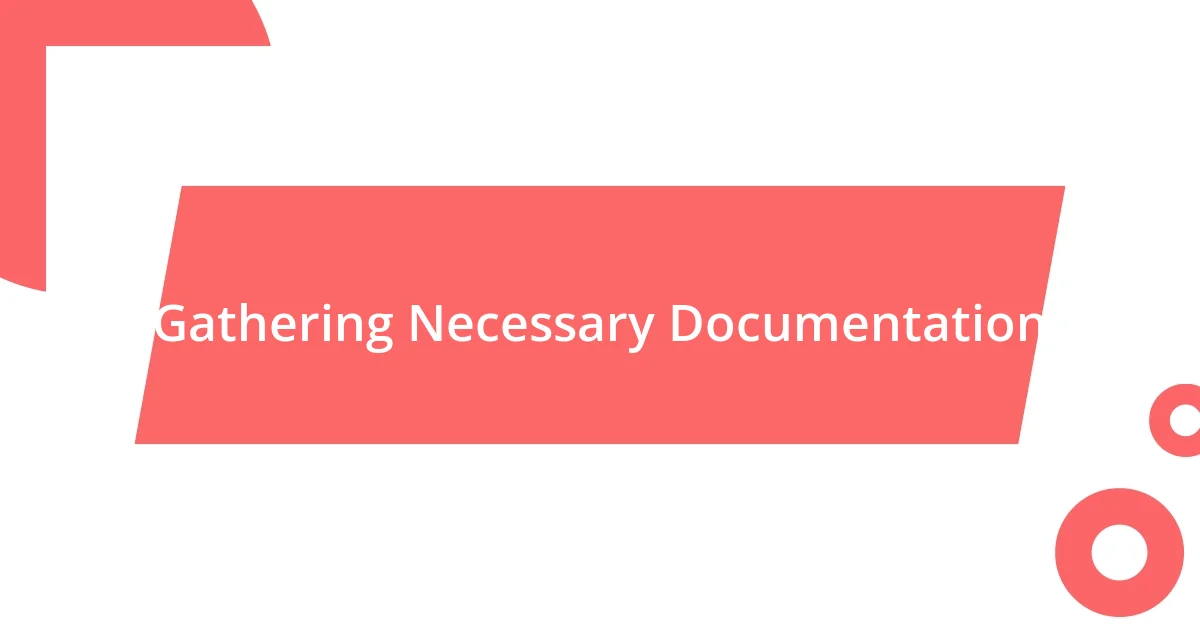
Gathering Necessary Documentation
Gathering the necessary documentation was, without a doubt, a significant part of my licensing experience. I distinctly remember the flood of emotions I went through as I scanned lists and organized files. It felt like preparing for an important exam, and trust me, my nerves were real. I often found myself second-guessing—did I have everything I needed? It’s so easy to overlook something when you’re juggling multiple requirements.
Here’s what I learned about the essential documents typically required:
- Proof of Identification: Essential for verifying who you are; I always kept copies handy.
- Business Registration Documents: These validate that your business is legitimate, which can ease scrutiny.
- Insurance Certificates: Having comprehensive insurance showed that I was serious about protecting my business and clients.
- Financial Statements: These offer insight into the viability of your business, and they often need to be up-to-date.
- Training Certifications: If you provide specialized services, these can be crucial for demonstrating your qualifications.
I can’t emphasize enough how meticulousness in gathering every piece of documentation can make things smoother down the line. It not only helps avoid delays but also fosters confidence when presenting your case to licensing authorities. Each document signifies a piece of your story, and conveying that, backed by solid paperwork, carries a weight that shifts the process from intimidating to empowering.
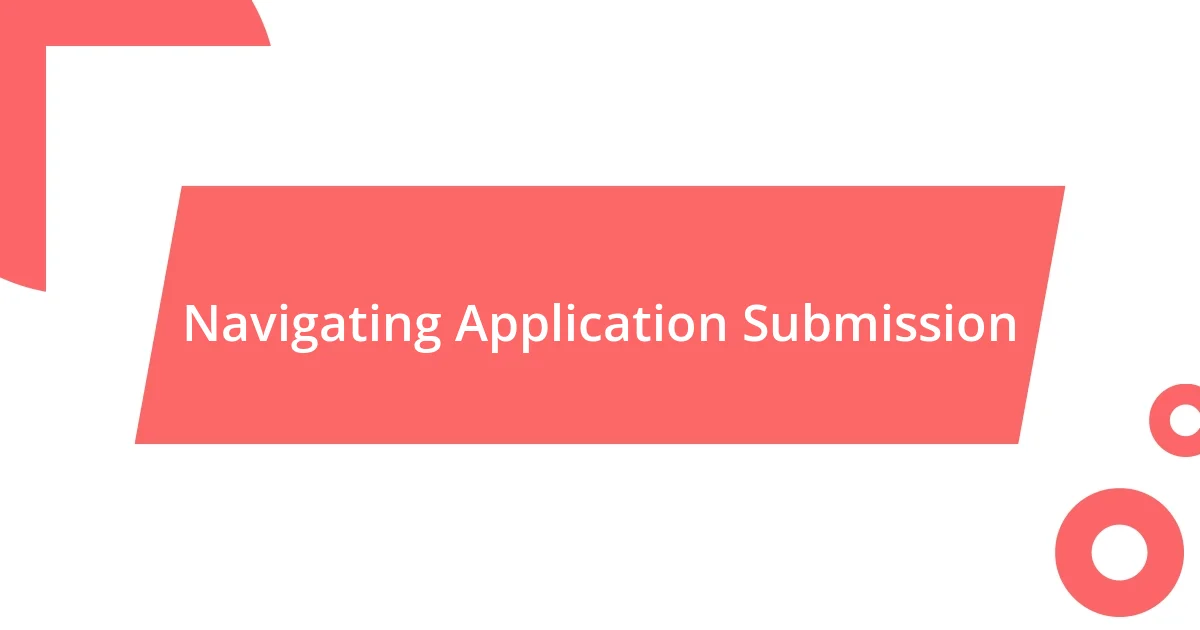
Navigating Application Submission
Navigating the application submission was a pivotal moment in my licensing journey. I remember the nerves hitting me as I clicked ‘submit’ on the online portal. Was everything in order? That feeling of hovering uncertainty kept me awake the night before—I even double-checked my uploaded documents to ensure I hadn’t missed anything. I think we’ve all been there, questioning ourselves and the infinite possibilities of error lurking in our haste.
One strategy that helped me immensely was breaking down the submission process into manageable steps. I created a timeline that aligned well with the deadlines, allowing me to pace myself. It felt like training for a marathon—I could visualize the finish line and each mile marker along the way. Have you ever experienced a sense of relief just by breaking things down? It gave me not just structure, but also a framework to manage my expectations and stress levels.
As I hit that ‘submit’ button, I also learned the importance of following up. I wasn’t prepared for the waiting period that followed; it felt interminable. Adding a polite inquiry after a couple of weeks felt like sending a friendly nudge. Each communication reassured me that I was still on track, fostering a sense of control. It reminded me that staying engaged with the process is essential—after all, we’re not just waiting; we’re actively part of the dialogue, building our future step by step.
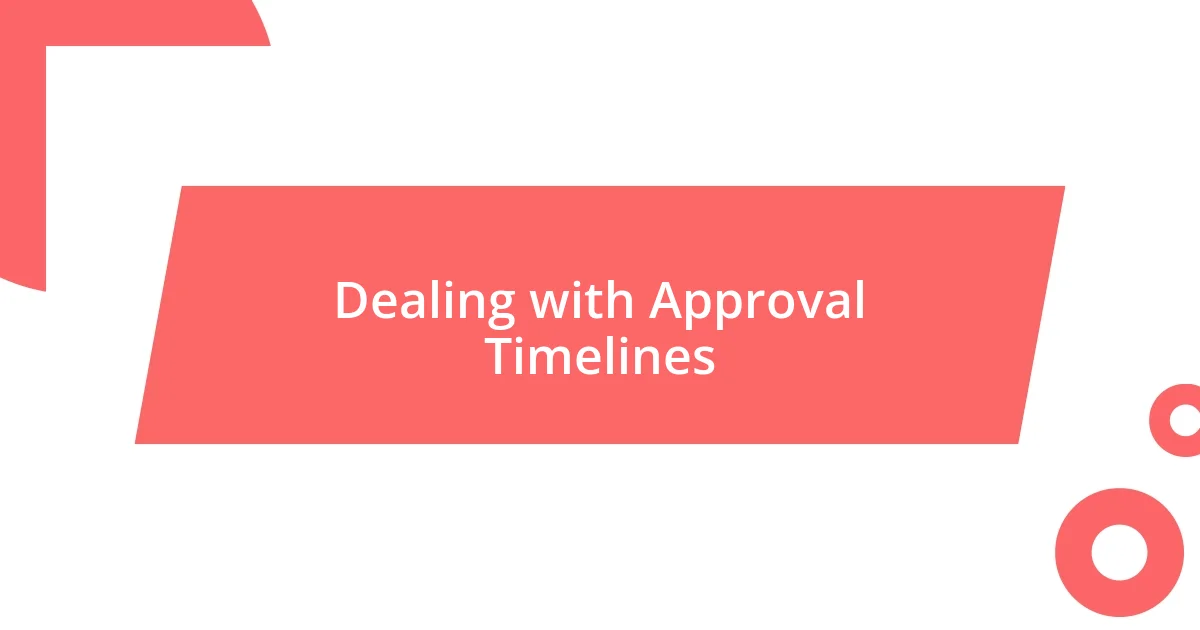
Dealing with Approval Timelines
Dealing with approval timelines can truly test my patience, and I’ve felt that firsthand. Waiting days or even weeks for a response can evoke a mix of anxiety and frustration. At one point, I found myself refreshing my email repeatedly, half-hoping for good news and half-dreading that inevitable “we need more information” request. It’s almost funny how time seems to stretch during those periods—have you ever felt like every tick of the clock was mocking you?
What helped me cope was setting up a sort of “waiting strategy.” Instead of anxiously clock-watching, I filled my time with other productive tasks. I tackled smaller projects, networked with peers, or enrolled in a workshop to boost my skills. I must admit, this approach transformed my experience from one of idle waiting to active engagement. Have you tried channeling that anxious energy into something constructive? It certainly shifted my perspective, making those long approval timelines feel less like a waiting game and more like an opportunity for growth.
I also learned that keeping communication channels open with the relevant authorities is vital during these delays. When I experienced a particularly drawn-out approval process, I made it a point to touch base with them regularly. Surprisingly, a brief, friendly inquiry not only reinforced my commitment but also provided clarity about where my application stood. It turned what could have been a passive ordeal into a more involved and dynamic process—like glancing at a GPS while on a road trip to check how far you’ve come, instead of just staring out at the endless road ahead. Wouldn’t you agree that staying proactive helps in easing the mental burden of uncertainty?
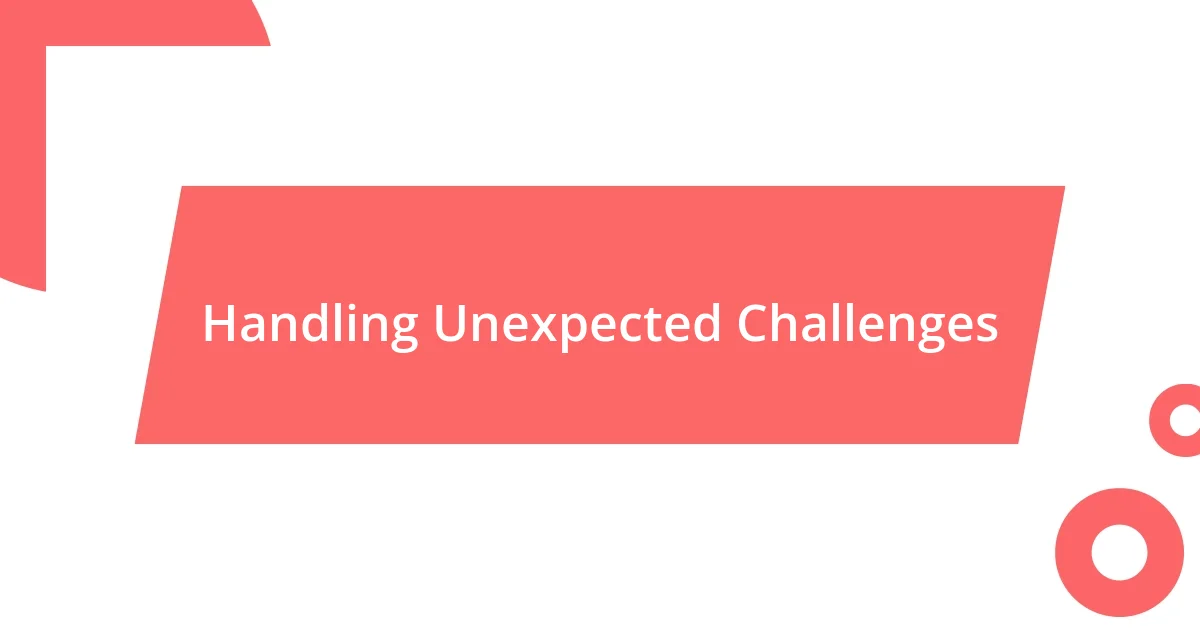
Handling Unexpected Challenges
Unexpected challenges are part of the licensing journey, and boy, have I faced my fair share. I remember one instance when I received a request for an additional document just days before my submission deadline. It felt like a punch to the gut—suddenly, I was racing against the clock, tearing through my files to locate what was needed. Have you ever been caught off guard like that? It’s a sinking feeling that can throw everything into chaos if you let it.
In moments like these, I found it helpful to take a step back and breathe. Instead of spiraling into panic, I made a quick checklist of what I had to do and prioritized tasks based on urgency. This mindset shift allowed me to regain control amid the chaos. Does taking a deep breath and organizing your thoughts work for you in stressful situations? It certainly does for me, as it allows for a clearer perspective, making the impossible feel feasible.
Learning to embrace flexibility was another game changer. On one occasion, I thought I had everything perfectly lined up, only to be met with another unexpected hurdle. Instead of feeling defeated, I reminded myself that adapting is part of the process. I even started carrying a small notebook to jot down thoughts and adjustments as challenges arose. Have you ever found that writing things down helps you process and tackle issues more effectively? This little habit transformed my approach, turning unexpected challenges into opportunities for growth rather than obstacles.

Tips for a Successful Outcome
To achieve a successful outcome in the licensing process, I’ve found that preparation is key. A few weeks before my big submission, I created a detailed checklist of every document I needed. This proactive approach alleviated a lot of last-minute stress and ensured I didn’t overlook anything crucial. Have you ever felt the weight lift off your shoulders just by being organized? It really makes a difference!
Another tip I swear by is seeking feedback from peers or mentors who have navigated similar waters. I once ran my application by a colleague who had recently been approved for a similar license, and their insights were invaluable. They pointed out a couple of areas I hadn’t considered, helping me refine my submission. Doesn’t it feel good to have another set of eyes looking over your work? It provides a sense of reassurance and can elevate the quality of your application significantly.
Lastly, maintaining a positive mindset can’t be overstated. During a particularly tricky licensing process, I decided to adopt a mantra: “Challenge accepted.” Each hurdle became an opportunity for learning instead of an obstacle. This shift in perspective not only kept me motivated but also made the experience much more enjoyable. Have you tried adopting a positive mantra in tough situations? Trust me, it can transform your approach entirely.







